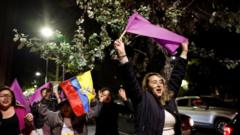Sitting President Daniel Noboa has achieved a significant victory in Ecuador’s presidential run-off election, securing a full four-year term. After emerging from a snap election only six months ago, Noboa declared his win as "historic" amidst a backdrop of heightened violence attributed to powerful criminal gangs. Addressing supporters in Santa Elena, he confidently stated there was “no doubt” regarding the election's outcome, capturing approximately 56% of the vote based on preliminary results from the national electoral council.
Luisa González, his left-wing opponent and protégé of former President Rafael Correa, expressed disappointment, alleging electoral fraud without substantiating her claims, a statement that fueled tensions following the election. Noboa emphasized the significance of a decisive victory, more than ten points clear, and noted that “this has been achieved through the perseverance, the struggle, and the hard work” of his supporters.
The president, in office since November 2023, has consistently defined his administration by a robust military response to rampant gang violence, which has claimed thousands of lives in recent months, making Ecuador’s streets perilous. Despite a slight decrease in homicide rates during his term, violence remains a pressing concern for citizens, who ranked security as their top issue before the election. Noboa’s strategy has involved bolstering military presence and establishing new high-security prisons, while he has expressed interest in allowing foreign military bases to curb the violence, a contentious proposition in a country governed by a legacy of Correa’s policies.
Further complicating Noboa's presidency are economic challenges as the nation grapples with a lack of power and unemployment, exacerbated by widespread droughts last year. To address these issues, he is advocating for increased investments in renewable energy sources to diversify Ecuador's energy portfolio. Additionally, there is a clear desire to strengthen relations with the United States, marked by recent trade policy shifts such as imposing tariffs on Mexican imports and reversing leniency previously afforded to Venezuelan migrants.
With the political landscape deeply divided, Noboa will face ongoing scrutiny as he seeks to prove the effectiveness of his strategies against crime while cultivating a spirit of unity in the face of discontent. The aftermath of the election has left a polarized nation, with numerous supporters of González longing for the perceived stability and prosperity found during the Correa administration, a stark contrast to the current tumultuous atmosphere.



















